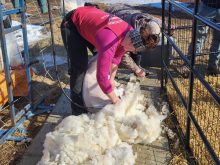Lately, Larry Sears has been busy with calving and all the other things that accompany spring on a ranch.
In April, Sears of Stavely, Alta., lent his name to a $7 billion class action lawsuit filed in Alberta, Saskatchewan, Ontario and Quebec against the federal government and a multinational feed manufacturer.
The lawsuit says the government did not ban ruminant meat and bonemeal from cattle feed soon enough. The ranchers say Canadian cattle producers lost billions of dollars after beef trade was stopped in May 2003 with the discovery of the first case of BSE, likely caused by cattle being fed contaminated feed.
Read Also

Charges laid after cattle theft
Saskatchewan RCMP lay two charges against a man after six cattle went missing.
BSE was a huge body blow to the agricultural industry, but everyone believed the borders would reopen and life would get back to normal. Now, after two years of borders closed to live cattle and beef from animals older than 30 months, cattle producers have dusted themselves off and are ready to fight.
“There is an understanding of the frustration that is out there,” said Sears.
“As far as the litigation end, there are a lot of people that have empathy with it and a number of people have offered financial support when we get to that stage,” he said.
On May 9, lawyers for the class action suit served Canada’s feed manufacturer Ridley Corp.’s Australian parent company with papers claiming it was also negligent in not stopping the use of cattle remains in cattle feed.
Cameron Pallet, the group’s lawyer, said they’re asking for compensation from the federal government and the feed manufacturer for lost income for the past two years.
“All we want is the other 85 percent of what they cost cattle producers.”
In Manitoba, Rosser-area grain and cattle producer John Morrison has started work on a class action lawsuit against the Montana cattle group R-CALF for damages caused since March 7, 2005, when the American cattle group forced the continued closure of the U.S. border to Canadian cattle.
“We’ve had producers signing up like crazy. Things have been going very well,” said Morrison.
Their organization, Fair Market Beef, has been gathering $20 cheques through different auction markets and farm organizations to help support their cause.
“It’s $20. It’s less than a case of beer.” Morrison hopes the documents will be filed in the federal court in Billings, Mont., this week. The intent is to force R-CALF to post a bond of $7 million a day for every day the U.S. border remains closed to Canadian cattle.
Morrison admits it will take years to get the money from R-CALF, but Canadians can no longer stand by while the cattle group decides if the border stays open or closed.
Michael Woods is the lawyer for another group called the Canadian Cattlemen for Fair Trade, which is taking action against the BSE situation. He hopes by the end of May to finish filing more than 100 notices of arbitration under Chapter 11 of the North American Free Trade Agreement.
The notices were served in March. The group believes the closure of the American border has cost the more than 100 family businesses in the action more than $300 million.
“The border being closed has caused great economic harm,” said Woods.
The group argues their businesses were built on fair trade between the United States and Canada. The continued closure of the border has shown that BSE has turned into a trade and investment dispute and not a health and safety issue.
Woods said while he knows the NAFTA challenge will not be speedy, he is optimistic they have right on their side.
“I think we have a very good case. We have a very strong team. We have a case we’re quite happy about,” said Woods, who estimates it would be at least three years before there is an outcome.
The Canadian Cattlemen’s Association has also started musing about using either the World Trade Organization or the North American Free Trade Agreement to fight the border battle with the U.S.
In April, the organization sent a letter to international trade minister Jim Peterson asking the government to initiate a dispute settlement mechanism either under NAFTA or WTO.
John Masswohl, CCA’s director of international relations, said there has been little response from the federal government.
“At this time we have not had a formal response from the government other than to hear back to say, ‘they are considering it,’ ” said Masswohl.
Under parts of either agreement one country cannot hold imports from another country up to a higher standard than domestically produced goods.
Masswohl said the federal government seems to be reluctant to rock the co-operative relationship it has with its American counterparts. While the relationship is good, the border opening was hijacked by a Montana judge who ruled the border should continue to stay closed.
















